It’s almost impossible to remember a world before search engines existed. Internet search engines enables you to make your blog or website visible to the world. Whether you use your computer or phone, you can now pull up a browser or an app and find anything you want.
Each search engine uses its own algorithm, which determines what search results you see. You might notice that some give you localized results that provide you with information about relevant companies that are near you.
Other engines will give you general information with the option to do more specialized searches.
Best Search Engines 2023
- Google: The giant in the search engine space
- DuckDuckGo: If privacy is a concern, this is the best option.
- Bing: Earn points while searching with this engine.
- Ecosia: This is the best choice for environmentally conscious users.
- Neeva: For an ad-free experience, switch to Neeva instead of Google.
- Yahoo!: This popular web portal uses Bing’s search engine to deliver results.
- YouTube: If you’re looking for videos, YouTube is your go-to search engine.
- CC Search: Find copyright-free content with ease.
- Baidu: Chinese users will find this search engine useful.
- Swisscows: A family-friendly search engine that filters inappropriate content.
- Gibiru: If you’re looking for uncensored private searches without retargeting
- Startpage: Get answers from Google while keeping your privacy protected.
- Yandex: The top search engine in Russia.
- Naver: A South Korean search engine with comprehensive features.
- AOL: One of the first and easy-to-use search engines that still exists today.
- Search Encrypt: privacy-focused search engine uses local encryption
- Ask.com: Another web portal and search engine that has been around for years.
- OneSearch by Verizon Media Group : unfiltered private browsing experience
- Wiki.com – Best suited for anyone searching Wikipedia articles
The best internet search engines will provide:
- Results that match your search criteria
- A basic interface that you can easily view
- Options to change the parameters of your search
Though you might think that all search engines are the same, there are some variations between the top options.
Once you look at the best search engines of 2023, you can find the perfect one for use at home or work.
1. We Have to Mention “Google Search”
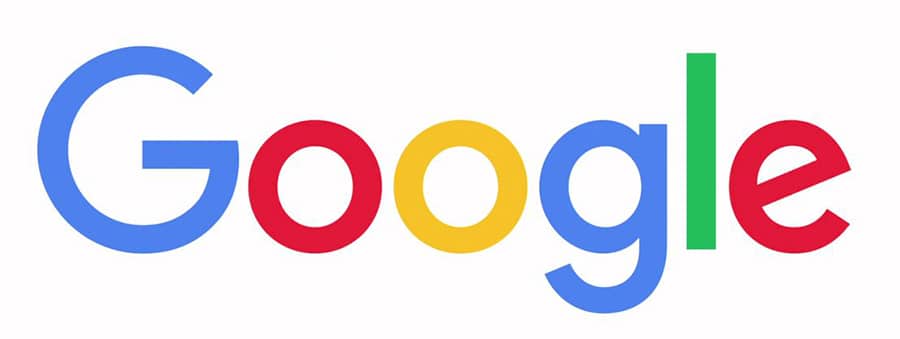
Let’s get this one out of the way.
When it comes right down to it, Google is the king of search engines. Larry Page and Sergey Brin were Stanford University graduate students working on a project together when they stumbled across a new method of doing searches online. They discovered that they could analyze the results found on other pages and use that information to rank the most popular pages across all internet search engines. During its early days, the duo actually used the Stanford website to host Google. They also made attempts to sell the search engine to others. When they did not get the offers they wanted, they put Google online and made it the top search engine of all time.
Google is popular because you can use on any device. When you do a search on your phone, you can access the same information and pages that you can from your computer. It uses its own unique algorithm, which determines how pages rank in its result based on keywords and other content. When it released its Panda update, it completely changed the ranking of websites. This update allowed Google to drop the ranking of sites that provided little information and those that used a large number of keywords without any related content. The sites that you now see at the top of the page contain relevant content based on your search.
The one downside to using Google is that it follows and tracks your online patterns. If you recently visited a website to check on the cost of flights to an exotic destination, you can expect to see ads about that destination the next time you go online. Google can transfer ads across devices too. The same content that you look up on your phone can result in the ads that you see on your computer and vice versa.
As a Google user, you’ll gain access to all the top information that you want. When you do a search, you’ll see more than just relevant websites. Google will show you trending videos and news relating to that topic and a description or definition of a word or term off to the side. You can use the buttons on the top of the page to view only news or photos relating to your search too. Google also has an advanced search setting and lets you customize what you see when you do a search. You’ll also find other tools that you can use online through Google such as Maps to find a new restaurant and Gmail, which is one of the world’s most popular free email services.
According to StatCounter, as of February 2023, Google have over an 85% market share of all desktop search, and over 96% market share for mobile search, globally. All other search engines share the remainder amongst themselves.
In 2023 Google will be launching Bard an AI assistant to help people find more information beyond just a bunch of links.
2. Duck Duck Go Search

When you head to Duck Duck Go Search to do a quick search, you might find that the site looks a little like other search engines that you used in the past. This one is a little different though because it will never share your information with anyone else. Are you tired of searching for birthday or holiday gifts and then seeing the same gift ideas pop up as ads when you visit your favorite websites? Using this search engine can help you avoid that problem and can also stop your loved ones from seeing what you bought later.
Duck Duck Go Search went live in 2008 after the founder sold his social networking site to Classmates.com. Though the site initially had quite a few ads, it now gives users the option of turning off those ads. Once you opt out, you’ll never again see ads when you visit the site. There is a connected site that acts as customer support too. You can visit this site to discuss any issues you had with others and to make suggestions or give feedback about your experiences. Apple added it as an option for using its internet search engine too.
In addition to being popular because it doesn’t share data, Duck Duck Go Search is also popular because it provides users with data sourced from more than 400 other sites. It uses Wikipedia to create short descriptions that let you view basic information about a search term. You can also use a feature called Instant Answers that show you answers to some popularly searched for questions. Duck Duck Go Search has prompts that function like predictive text also. As you enter a term or phrase, it will make suggestions based on what it thinks you want to help you narrow down the results that you see.
3. Bing

Some refer to Bing as one of the best ways to search for adult content on the web because it doesn’t remove adult results from its searches.
When you do a search on this site via the video or photo section, you can view adult content that you won’t see on other sites. If you share a computer with others or worry about your kids viewing that content, you can change the settings. Anyone who uses the same search engine will view content that is safe for the whole family. You can also use safe browsing to prohibit others from viewing your past searches.
Bing is one of the largest search engines in the world and backed by Microsoft. MSN, which the company also owns, previously offered a Windows Live Search. This would later become Live Search and then Bing. Bing went live in 2009 after Microsoft spent several years working with focus and test groups to pick a name. They settled on Bing because it is short and easy to type. The name also brings to mind the word bingo, which invokes the feeling of getting instant results.
When you use this search engine, you’ll find a simple interface that includes a background image that changes every day. There are also navigation panels and pages that let you view any past searches you did and view information relating to your current search. Some instant information is also available, including current scores in top games and final scores in previous games. You can also use a calculator and other tools.
Bing even offers a cashback feature that lets you earn money for purchasing products online.
With a Bing account, you also receive points for taking short quizzes and doing online searches. Those points let you enter contests to win big prizes and to get Microsoft items for free.
In February 2023 Bing added an AI chat assistant to their search engine and Edge Browser.
4. Baidu

Baidu today, is the largest search engine in China. It has grown to have around 1.2% of the global market share of search, which makes it one of Google’s biggest rivals. Although this number may seem miniscule, Baidu is used by around 76% of internet users in China for search, and offers a range of different services.
Baidu was founded in 2000 by Robin Li and Eric Wu, based on earlier works dating back to 1996. They began by developing a Chinese language search algorithm that was specifically tailored to the Chinese market. This allowed Baidu to better understand and index Chinese-language web pages, and offer more relevant search results to Chinese users.
Over time, Baidu expanded its offerings to include a range of products and services, such as news, maps, and online advertising. Today, Baidu is the dominant search engine in China. It is also one of the largest internet companies in the world, with a market capitalization of over $60 billion.
The name “Baidu” itself has an interesting origin. It comes from a poem by the Song Dynasty poet Xin Qiji, which describes a line of people searching for a beauty in the tower of the Baiduan Mountain. Li and Wu chose the name “Baidu” because it reflected their vision of creating a search engine that could help users navigate the vast landscape of information on the internet.
5. Dogpile

During the early days of the internet, it seemed like every development team had their own search engines. Dogpile was one you might remember using that later disappeared at the end of the 1990s. Many remember seeing the dog that the company used as its mascot running across the screen as it grabbed a search and brought it back to them. Though Dogpile never really went away, it became much less popular than other options to the point where you probably forgot all about it. It’s now back and fairly popular with many users.
Dogpile features a homepage that includes a search engine box and some other helpful tools. When you do a search, it checks the way both Yahoo! and Google ranked pages based on that same search and shows you what it found. This is a great way to make sure that you have all the available information that you need. Dogpile also shows you favorite searches that include the most popular searches of the day and quick starts that let you set it as your default search engine or homepage.
One of the best things about this search engine is that it lets you do one basic search, but it also lets you choose the type of content that you want to view. Not only can you search through images and videos, but you also have the option of searching through news and checking for local results. Dogpile has a shopping search that will show you an item for sale and the sites that sell it with the prices charged by each page. Dogpile has some features that you might recall using in the past too such as White Pages and Yellow Pages for looking up phone numbers and addresses. Many like that it checks for misspelled words and makes suggestions based on what it thinks you actually want to look up.
6. Yahoo!

Though Yahoo! is a name that many people know, it’s probably not the first name that comes to mind when you think of search engines today. In the early days of the internet, this became one of the top options for those who wanted to use the web. Not only did it offer one of the first email services, but it also offered chat rooms that let you talk with other users from around the world. The site even featured games that you could play with others. One thing you’ll notice about Yahoo! today is that it looks quite different than it once did.
Depending on your age, you might remember the days when you entered a term and then used arrows to navigate through different topics to find the information you needed. Created by two students at Stanford University, the site originally used the name Jerry and David’s Guide to the World Wide Web. The site grew rapidly through the late 1990s and acquired a number of smaller websites along the way. It purchased Associated Content, which allowed users to write their own articles for money. Yahoo! later purchased some of that content for use on its other sites before shutting down the main website.
Yahoo! is still fairly popular among those who want an aggregate website that lets them do multiple things. The homepage features an internet search engine that lets you do searches and boxes and links that allow you to visit other areas of the site. Those links take you to trending pages that Yahoo! gathers from recent searches. It still offers some games, though there are now fewer traditional games available and more mobile games listed. Yahoo! also features travel information that you can use before planning your next trip and funny videos that you can watch and share with others.
7. Qwant
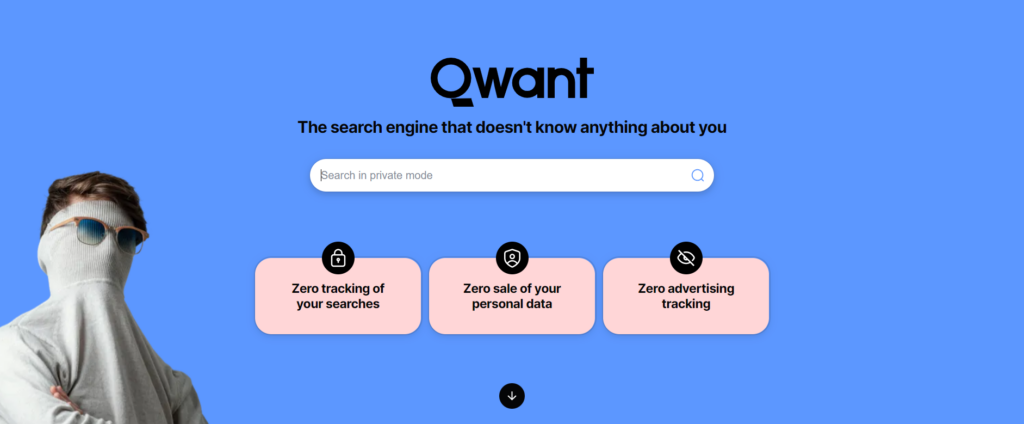
Qwant is a French search engine that was launched in February 2013 and is operated from Paris. It is one of the few EU-based search engines and distinguishes itself by not employing user tracking or personalized search results. Qwant claims to put aside algorithms that pre-format the web and turn users into a commodity.
Qwant offers three main entry points: the normal homepage, a light version, and a Qwant Junior, which is a search engine aimed at children. The latter filters search results suitable to the younger audience. The search engine is available in over 20 languages and has partnerships with various European companies and institutions.
As of 2021, it was the 105th most visited website in France and within the top 1500 visited in the world. The search function of this engine is powered by Bing, but they have developed and continue to improve their own web indexing technology.
The algorithms they use allow them to provide comprehensive and impartial results to users without having to collect personal data. Its commitment to not employ user tracking or personalized search results is a feature becoming more and more popular.
8. Brave

One of the most recent engines to launch, and another with privacy at it’s core, is the Brave Search. This engine was launched in June 2021 by the makers of the Brave web browser and aims to be a real alternative to Google with privacy at its very core. It provides users with private, independent search results without tracking their searches, clicks, or personal data.
Brave Search is built on an independent index and uses a combination of algorithms and community-curated results to provide users with relevant search results. The search engine also offers various privacy features, such as the ability to use it without a trace and the option to use anonymous search.
The Brave Search engine is built on Braves own platform, which allows it to integrate with the browser more easily and offer a seamless user experience. Brave Search is also designed to be fast, with results appearing instantly as users type in their queries.
I like the ‘summariser’ feature which when you ask a question in the search engine, provides a summarised answer at the top of the results page. It also provides the sources that the AI behind the answer, ‘Brave AI’, used to generate the response. It’s early days but this one is promising.
9. Ecosia
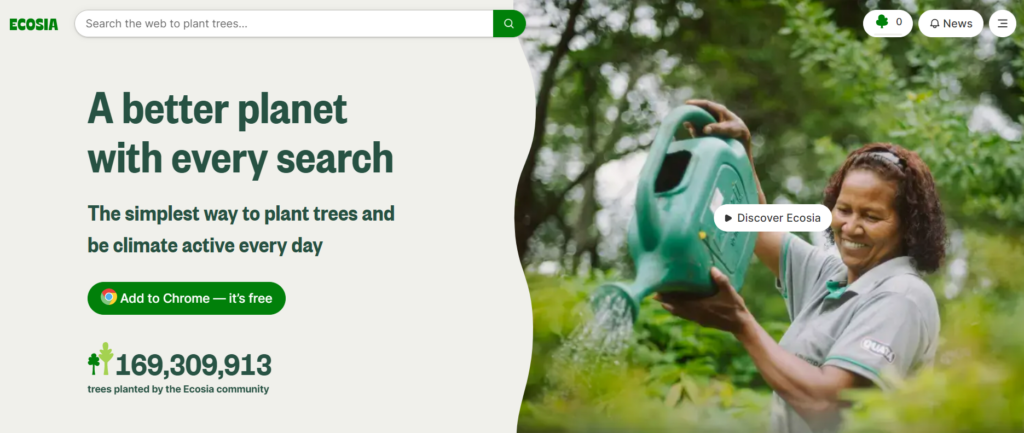
Ecosia offers web users a chance to make a difference while they browse the web. Founded in 2009, this search engine uses its profits to plants trees around the world to combat deforestation. As of 2019, the company had planted over 78,000,000 trees, and as of March 2023, they have planted over 169,300,000. Double the trees in 4 years, thats good growth and a good environmental impact. There’s even a counter on the website to display the search engine’s impact.
So, how does Ecosia achieve this feat? Well, the company behind Ecosia offers complete transparency. Revenue is generated through search ads. This is a stark contrast to other search engines. Ecosia does not sell your data to advertisers. Not only that, but all searches are made anonymous after a week. To provide even more transparency, Ecosia makes its financial reports public every month.
You can access the Ecosia search engine through the website. Alternatively, Ecosia offers a browser extension for most popular programs. All fo the servers that Ecosia uses to perform searches run entirely on renewable energy, which is a nice added touch to make the search engine even more appealing to energy-conscious Internet users.
10. GoodSearch
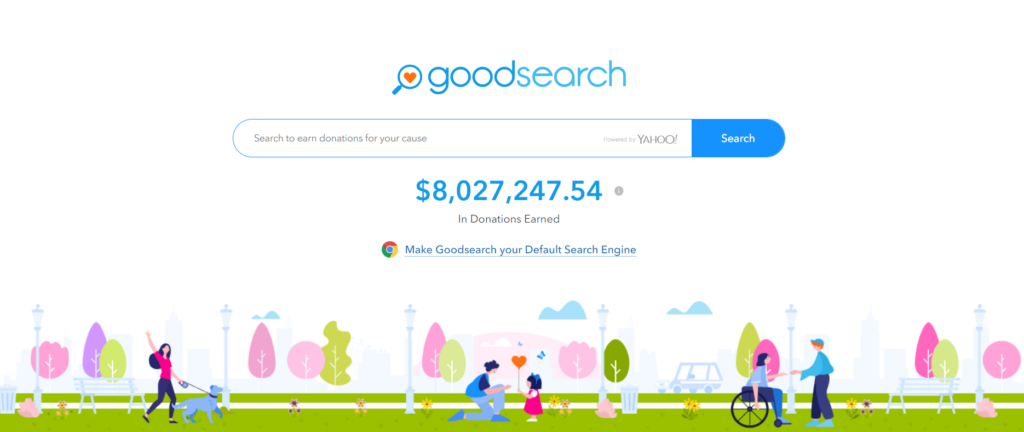
GoodSearch was launched in 2005 with the goal of raising money for charity by giving away half of its advertising revenue to charities and schools chosen by its users. The search engine is powered by Yahoo and the results you get from this engine are similar to what you would get from that platform. But what sets GoodSearch apart is its commitment to giving back to the community.
Users can select a charity or school of their choice to support, and every time you use the search engine, a portion of the advertising revenue generated from your search is donated to that charity or school. GoodSearch also offers a variety of ways for users to support their chosen charity, such as through online shopping, purchasing and using coupons or participating in surveys.
It has many features such as autocomplete, video and image search that you get with most competing search engines. They do track usage though, and they will sell your data unless you choose to opt out of this.
11. Quora

Have you ever used Google because you wanted an answer to a specific question? Depending on the question, Google may not offer the exact response that you want. The problem is that most search engines use aggregate data and shows results that will match what thousands of other searchers wanted to know. Quora is a unique little search engine that lets you browse through questions and read responses that others posted and post your own question. While some answers aren’t quite as detailed or mature as some would like, the site is a solid alternative for those who have questions that need answering.
With Quora, you can create your own account that includes as much or as little information about yourself as you would like. The site recommends filling out some of the sections though because it will use that info to recommend new content. You can use the category listings to view questions that other users asked. For example, you might use the New York City category and then select the Hotel category to find out what hotels people who live in the city recommend and which ones tourists stayed in and loved in the past. Quora also lets you post questions when you cannot find a good answer.
As a search engine, Quora is best for those who want to find little nuggets of information. When you use the search engine to write a question, it will find similar questions and let you click on them to read the answers shared. The Related Questions on the side of the screen show you similar questions to the one you clicked on, which you can access as you need. Quora will also notify you each time that you log in to show you any responses on the questions that you asked.
12. Google Scholar

The best search engine for academics and those currently in school is Google Scholar, which provides users with access to more than 150 million documents. This is a separate section of the main Google site that allows you to create your own personal library filled with documents and articles. The site added a citation feature in 2006 that makes it easier for you to cite the works that you want in your own papers. You can also use those citations to access articles that cited the same work, which helps you find relevant documents.
Google Scholar typically lists articles and journals that are no more than 10 years old. Content older than that is available via Google Books. Many academics like that they can use this search engine to narrow down their results. You can tell it to only show results from articles and documents published within the last year or the last two years. It also has a custom range that lets you enter the dates that you want to search through. There are separate search features that let you search by date or the relevance that each result has to your search term(s).
Not only does Google Scholar let you see articles from popular journals, but you can also view case laws and files relating to major court cases. It also has an alert feature that lets you enter your search parameters. You’ll receive a notification when any new article becomes available that matches those parameters. Academics like that this search also lets them look through patents and citations. If you want to find what articles mention a term you want to learn about, you can search through those citations. While Google Search isn’t a search engine that everyone will use, it’s a popular choice for writers, college students and teachers.
13. Ask.com

Ask Jeeves was one of those fun and unique search engines that existed during the early days of the internet. It featured a butler named Jeeves who would race off the screen when you performed a search and return with your results on a silver platter. Ask Jeeves went through a number of changes after its launch as new investors came in and its development team changed. After becoming Ask.com, the site went head to head with other search engines before deciding to shut down its own team and hand its search features over to another company. Ask.com still exists today and serves as one of the most basic search engines around.
Ask.com looks quite basic. Its homepage features just the Ask logo in red on one side with a search box connected to it. As soon as you enter enough letters that the site can predict what you want to find, it will provide you with a list of related searches. You can click on any of those searches and get results back in a fraction of a second. The results that you see are quite typical to those found by other search engines. If you search for a name, you’ll see the official site of that individual and his or her IMDB and Wikipedia pages.
The site also puts related searches off to one side. Those searches include the same ones that others did after looking at the same search you performed. You can use the videos area of the site to view videos relating to your search. This section allows you to view the most recent, most viewed and most popular videos. You can also view those videos based on how long each one runs. Ask.com also lets you ask questions and view sites that have answers to those questions.
14. Internet Archive

The Internet Archive isn’t one of those search engines that you’ll use on a daily basis, but it is a site that can provide you with information that you won’t find on other sites. One issue with the more popular search engines is that they constantly strive to provide users with updated information. When a site changes, the search engine will index its new pages and remove the old ones from its listings. This can result in you missing out on funny videos that you wanted to share or losing track of an article with tips you hoped to use at work.
Many people know the Internet Archive because of the Wayback Machine. Named for the time-traveling machine used by Mr. Peabody and Sherman, this search engine lets you enter any term and find pages that mentioned that term in the past. The Internet Archive maintains an active database of pages that it shot and indexed in the past. When you perform a search, you can view pages indexed years ago. Some of the oldest pages you can access date all the way back to 1995. The site also has an Archive-It feature that lets users create and share their own digital archives.
The Internet Archive really won’t help if you want to check on the price of plane tickets or see when your favorite band will tour next. It does come in handy when you want to watch live shows of that band performing in concert or if you want to see the hottest news stories from a date in the past. The site also gives users access to a large collection of digital books and archives. You can read books that are in the public domain and check out cultural artifacts from the comfort of your own home.
15. wiki.com
Created in 2004, Wiki.com is a unique search engine that focuses on providing results on Wikia, Wikimedia, and all other wiki-related sites. What makes Wiki.com is that it does not index traditional websites like Google or Bing.
Wikis are collaborative websites that are designed to act as a knowledgebase. You can find wikis on just about any topic imaginable. From small television shows with a cult following to broader topics like video games, there’s likely a wiki for it.
Wikis do not have a primary owner. The engine running a wiki acts like a traditional content management system. However, since there is no sole owner, collaborators all over the world can edit content to create the wiki.
The Wiki.com search engine sifts through these wiki sites to provide you with relevant results. The search engine allows you to narrow down your search to personal wikis, encyclopedias, or all public wiki-related sites.
16. Twitter.com
Twitter is a powerful social media platform that started in 2006. In the years since its launch, the platform has amassed a user base of over 330 million as of 2019. While Twitter started out as a place for users to share short status updates with friends, it has become a global source for world news, pop culture, and more. In fact, users often flock to the platform during major events to get insight before news outlets can even start reporting.
The Twitter.com search engine has made it easier than ever to gather information about a certain topic. Of course, the search engine doesn’t provide you with links to off-site pages. Instead, it shows you posts from users. These posts can include personal opinions, photos, videos, and even links.
Twitter’s hashtag system also comes into play. When users make a post, they can attach a hashtag to indicate that it belongs to a specific topic.
17. CC search
CC Search is a powerful search portal tool that is still growing. The goal of CC Search is to provide people access to public domain works. The world of copyright can make it complicated to find open-license work to use. The organization behind CC Search, Creative Commons, aims to change that.
A Creative Commons work is one that’s free to use. Depending on the particular level of the Creative Commons license, you may even be able to create derivatives of the work or use it for profit. Whatever the case may be, CC Search makes it easy to find copyright-free photos in one place. Currently, photos are the only option available. Though, Creative Commons has plans to expand the search engine for audio and text works.
The CC Search engine searched over 300 million images using open APIs and Common Crawl datasets. That way, results for a query are displayed in one organized space.
18. Gibiru
Gibiru is a secure alternative to traditional search engines. While many people don’t give it a second thought, traditional search engines gather tons of data as you browse. They can place cookies on your device and sell your information to third-party entities. This is pretty common in the search engine world and is what makes targeted ads possible.
With Gibiru, you don’t have to worry about any of that. It’s a truly anonymous search engine that provides you with unrestricted access to whatever you are seeking. The engine does not save search logs or IP information. It also doesn’t sell your information for profit. The makers of Gibiru are quite transparent about the process, providing peace of mind as you browse.
Currently, Gibiru is accessible through web browsers and dedicated apps for Android and Apple.
19. Search Encrypt
Like Gibiru, Search Encrypt was built to provide users with a private browsing experience. The search engine uses a unique method to protect your browsing history on the web. When you use the Search Encrypt, queries are automatically encrypted before they reach the servers. This method prevents your activity from appearing on your browsing history.
As a fail-safe, Search Encrypt also purges your search history after 30 minutes of activity. You can continue to use the search engine for longer periods while maintaining your history for reference. However, after those 30 minutes, the browsing is terminated for protection.
All of the Search Encrypt servers are located in the United States. Currently, the search engine servers over 10 million people. You can use the engine for free on your browser. Or, you can download a browser extension for Firefox and Chrome.
20. Boardreader
Those looking to search for opinions about a topic can turn to Boardreader. It’s a versatile search engine that’s often used by marketing professionals, public relations firms, and more. Rather than providing informative links on results pages, Boardreader focuses on bulletin boards and forums.
The search engine scours the web to find posts regarding the search query. Some of the discussion forums that Boardreader uses include Google Opinions, epinions, and more.
The great thing about Boardreader is that it aggregates important information into one place. It doesn’t just provide single-post results. Users will also see the number of replies the post received as well the date it was created. Boardreader also includes cached copies of forum posts, expanding your reach even further.
21. Yandex
While not too many people in the United States are familiar with Yandex, it’s one of the biggest search engines in the world. Yandex is a Russia-based search engine that serves approximately 51 percent of the country’s users. It’s comparable to other search engine giants like Google and Bing.
Yandex offers detailed searches that manage to combine local results with results from the main web index. This feature is designed to enhance the user experience. Instead of having to indicate a specific city when they are looking for a product, service, or business, Yandex will automatically use location information to provide results along with broader information.
This search engine is continuing to evolve. Yandex uses machine learning and artificial intelligence to constantly improve and provide high-quality results for its user base.
22. Startpage.com
Startpage.com is another search engine that’s looking to break the mold. The company’s entire philosophy is that your personal data should be yours and no one else’s. The search engine offers a private browsing experience without tracking. Startpage.com does not keep any personal data about you on your servers, so there’s nothing to sell to third parties either.
The unique thing about Startpage.com is that it still uses the power of Google to provide results. The creators of Startpage.com understand that Google is one of the most comprehensive search engines in the world. They pay Google to perform the search and provide results without trackers and logs.
Another cool feature of Startpage.com is Anonymous View. It’s designed to provide an additional layer of privacy whenever you click on a search engine result and visit another page. With this feature enabled, Startpage.com will ensure that cookies can’t be installed on your device.
23. Swisscows
Based in Switzerland, Swisscows is a privacy-focused search engine that has some unique features to offer. On the privacy front, Swisscows goes above and beyond. First, the search engine never tracks, stores, or sells your private data. That alone is admirable. However, Swisscows also ensures that their servers are safe from infiltration. They own all of the search engine servers instead of using those from cloud operators. The company’s data centers are in the Swiss Alps, away from potential harm.
If you’re worried about what types of content are displayed on Swisscows search engine results pages, you’ll be happy to know that explicit content is automatically barred. Thus, it’s a great family-friendly option.
Finally, Swisscows has an innovative “answering” system. When you type in a search query, semantics data will be displayed on the side. This data includes keywords about the query to answer any questions you may have had. For example, if you were to type “Angelina Jolie” into the Swisscows, words like “actress” and “movies” would pop up. Clicking on one of those words would then create a new search.
Good Search Engines That Are No More
Yippy
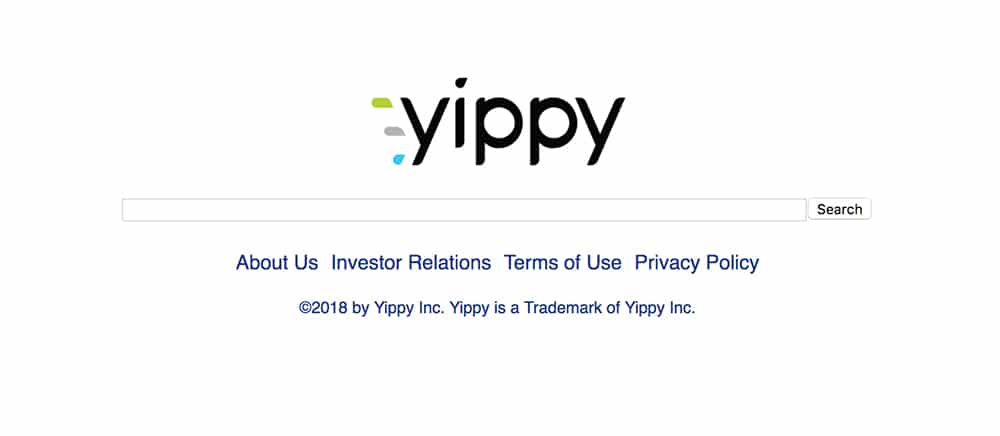
Most search engines show you only the most popular information and results available. Those engines use tools that search the web to find new sites, which it will then index for future results. This can cause problems because there are so many sites that those engines won’t index. Yippy was an example of a metasearch engine that used new technology to look for pages listed in the Deep Web and for pages that other sites skip. This is a great way to view content that you wouldn’t otherwise see and to find exactly what you need.
One thing that set Yippy apart from all the other search engines was that it gave you results in a cluster format. Let’s say that you want to look for something really obscure such as how to get started in tractor racing. Most search engines will simply show you basic pages created by racers and racing organizations. Yippy would show you the top 15 to 30 results that it found and list those sites on your screen. You would also see related searches to the side that showed you related keywords. You could click on any of those words to view those related sites.
Yippy was a great internet search engine to use when you wanted to go beyond official information. If you did a search for your favorite product online, you would likely see pages from the company that makes that product as well as sites that sell it and reviews that others posted. When you did that same search with Yippy, you could find articles about any of the dangers or issues related to that product and other ways in which you could use it. This was a great search engine tool to use in schools or some research based workplaces because provided you with academic journals and other references.
As of 2021, Yippy had their corporation status revoked in Georgia, and their website now redirects to duckduckgo. As of 2023 however, they have a new website, yippyinc.com, where they offer a demo of their product which is now sold as an enterprise solution or search application.
Conclusion
Millions of people around the world use Google every day to shop for new products and to get driving directions. Google started out as an aggregate site that used the searches done by other sites to rank its own pages, but it now has its own unique algorithm that ranks pages based on what it thinks users actually want to see.
Google is far from the only search engine that you can use those. This guide looked at nine other alternatives that are suitable for a range of different users. You might use the Internet Archive to watch videos of your favorite singers and bands before using Yahoo! to check the latest score when you’re away from your television. Other search engines can help you find the academic references that you need when working on a college paper. The top search engines can help you find absolutely everything you need.
If you liked this post, then why not check out more of our great guides.
Jamie Spencer
Latest posts by Jamie Spencer (see all)
- How to Start a Successful Cryptocurrency Website - September 12, 2024
- 50+ Ways To Advertise Your Business For Free On The Internet – 2024 Guide - September 5, 2024
- The Fastest WordPress Hosting Providers 2024 – If You’re Not Fast…You’re Last!!! - July 8, 2024

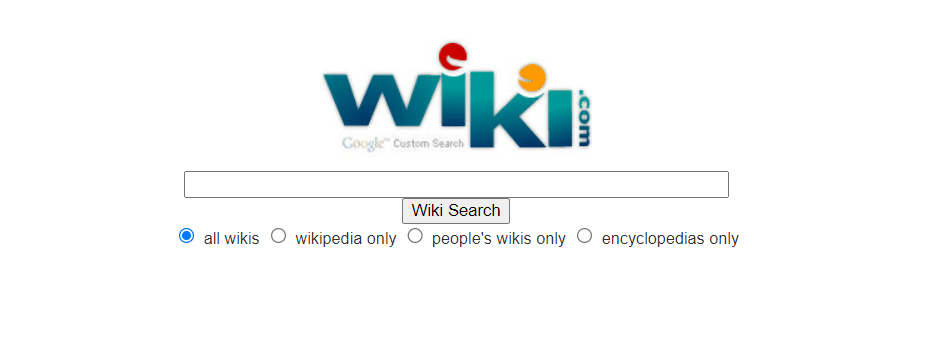
Any list of the best search engines that includes google or bing is not worth the time and effort involved to sort through it.
Almost entirely due to the monetisation model of these engines they are totally worthless. They are not user centric, the complete opposite, usually returning useless results from those who paid the most even if the answer is nothing to do with the required result.
For instance, a search for “control pedestal” (a steel box which can contain the control equipment that enables a machine or process operator to operate the system) comes up with pages and pages of bathroom suites.
Although I suppose that strictly speaking they can be considered as search engines, I don’t really understand why you list sites like twitter, internet archive or ask. I don’t think they are what people consider a search engine. I don’t agree with the previous comment either, I don’t think that the monetization issue means that the results offered by google or bing are bad, in my opinion they are quite relevant, I would even say that they are the best search engines nowadays. I personally use also duckduckgo as well and sometimes womoki.com to easily compare a search with several search engines.